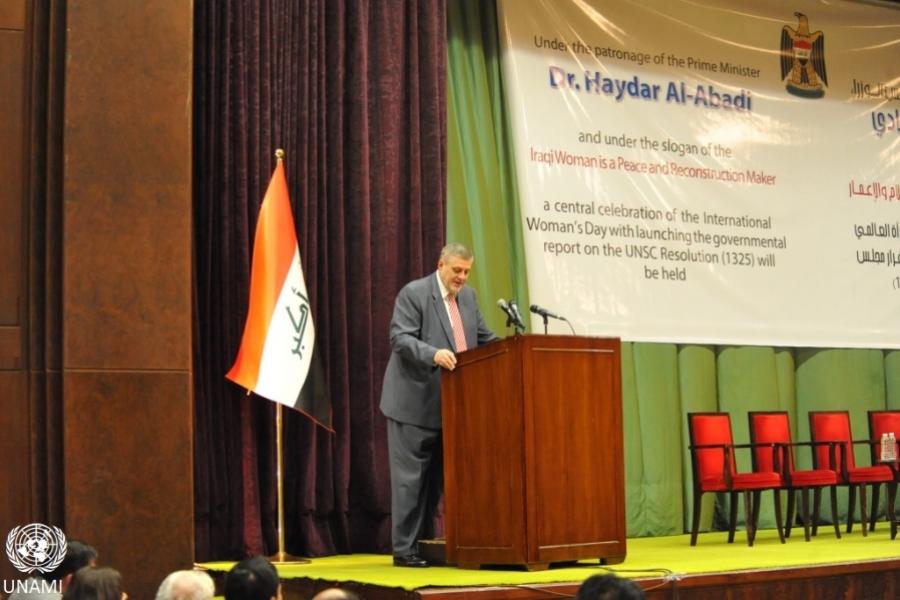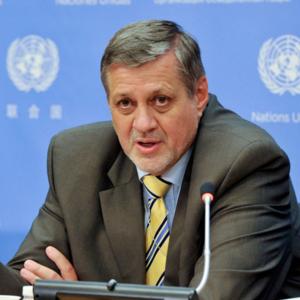Remarks by His Excellency SRSG Ján Kubiš at the High-Level Conference on the Implementation of the National Action Plan on UN Security Council Resolution 1325
Baghdad 7 March 2018

Your Excellency, Dr. Haider Al-Abadi Prime Minister of Iraq,
Your Excellency Dr. Mehdi Al-Alaq, SG of the CoM
Your Excellency, Dr. Thikra Al-Wech, the Mayor of Baghdad and the Chair of the Committee on the Advancement for Women
Your Excellency, Ms. Pakhshan Zangana, Secretary-General, the High Council for Women’s Affairs, Kurdistan Regional Government
Honorable Members of Parliament and Heads of Blocs,
Honorable Governors,
Distinguished Representatives of the Diplomatic Corps,
Distinguished Civil Society Representatives,
Distinguished participants,
I am honored to participate in this High-Level Conference on the Implementation of the National Action Plan on UN Security Council Resolution 1325.
The International Women’s Day in Iraq this year comes on the heels of a historic victory against Da’esh’s so-called “Caliphate” by the heroic efforts of the Iraqi people and its armed forces under the leadership of the Commander-in-Chief PM Abadi, by blood of the martyrs and sacrifices of women. It comes at the time of the ongoing process of stabilization, reconstruction, reconciliation, transitional justice and countering Da’esh’s extremist and hateful ideology. It also comes before the national elections, which must be inclusive and participatory. It is imperative that women have a key role and meaningful participation in the elections, in shaping a post Da’esh Iraq based on inclusion, respect for human rights, including rights of women and their empowerment. Women are the vote and voice for reconstruction, justice, reform and development.
On this occasion let us remember the thousands of women and girls killed, enslaved, trafficked, tortured and subjected to sexual violence by the Da’esh savage terrorists. Let us remember those who remain missing and let us pledge to make every effort to get them freed. Let us also remember the women survivors and their children who continue to suffer every day from the trauma of Da’esh and help them to reduce their suffering, provide for their future in safety and dignity. In this regard, I welcome the Government of Iraq and that of the Kurdistan Region’s efforts to respond to and prevent sexual violence in conflict notably the recent validation of the Implementation Plan for the Joint Communique on Prevention and Response to Conflict-Related Sexual Violence. The just concluded visit of UN SRSG on Sexual Violence in Conflict, Pramila Patten, stressed the importance of ensuring that alleged perpetrators are held accountable not only for the crime of terrorism but for the full extent of the sexual violence crimes perpetrated on Iraqi women and children including abduction, rape, sexual slavery and forced marriages. Policies should be developed for women from all components and communities to be included in these processes to guarantee that structural causes of such violence are addressed.
Distinguished participants,
Women’s leadership and advancement of women’s rights should always be at the forefront in promoting peace and security. In an era when terrorist groups like Daesh place subordination of and extreme violence against women and girls at the top of their agenda, our response in confronting them and erasing their evil legacy should be to place the empowerment of women and girls at the top of ours. Our approach to women and girls should not be to treat them only as vulnerable victims, but as the leaders and factors of positive change they are. Women who were affected disproportionally by the conflict with Daesh must be involved in conflict resolution and should also be part of peace and reconciliation processes in Iraq.
I welcome progress made on the implementation of the Iraqi National Action Plan (INAP) on UNSCR 1325, despite hurdles, including budgetary constraints. I also welcome the establishment of the National Team on the implementation of the UNSCR 1325 on Women, Peace and Security under the Chairmanship of the Secretary-General of the Council of Ministers. It is key that the necessary budget allocations are made in order to ensure full implementation of the next Iraqi National Action Plan. Its preparation will require coordination and collaboration across sectors to make sure that the lessons learned, good and bad, from the previous Plan are part of the design of the next plan.
The next INAP will also need to be cognizant of and work in coordination with other processes that are already taking place in Iraq, including security sector reform, justice, accountability and reconciliation efforts, the implementation Plan of the Joint Communique on Prevention and Response to Conflict Related Sexual Violence and economic reform empowering women. This will be critical in making sure that these efforts complement each other rather than compete.
Distinguished participants
Women must be in leadership positions in Iraq. There is no excuse to do otherwise especially in Iraq which is known for its rich history, culture, diversity, pluralism and tolerance. Iraq had the first female minister and judge in the Middle East, as well as the first airplane pilot.
Women’s role in the Iraqi society have unfortunately steadily regressed amidst decades of conflict. Dismantling the gender stereotypes and traditional attitudes hindering the role of women and their participation in the political, economic and social sphere is a challenge. In this relation, we will continue to question where the source of discrimination originates, in order to approach it effectively. This also means that we need to mobilize support of religious leaders, to ask where the religions stand in this.
Women’s political representation and participation in the political process remains weak. Representation of women in senior positions is lacking and must be enhanced. The elections are an opportunity for women, in particular to be a vote and voice for change. If there is no significant change in political party structures, women’s political participation will continue to be superficial.
Women are currently underrepresented in positions of power at the national and Governorate levels, with no women on the IHEC Board of Commissioner, all governors across the country are men, women representation in the judiciary is limited, there are only two women in the current Cabinet, and hardly a woman heads any of major parliamentary committees.
In the post-election period, the effective and meaningful participation of women in negotiations on government formation will signal a commitment to supporting women's political participation, to strengthening democracy, representation and inclusiveness. That will ensure their representation in the Cabinet and that their concerns are addressed, and their ideas are taken up in the future government’s program.
Enacting legislation to protect, advance and enshrine the equal rights, dignity, safety and opportunities for women in all areas of public life and protect them from all forms of discrimination and violence should be an indispensable part of women’s empowerment. The incoming Council of Representatives will have to embark on broad legislative reforms, including adopting the laws against perpetuating harassment, violence, including domestic violence and discrimination against women.
I thank you for your attention.
Speech by


